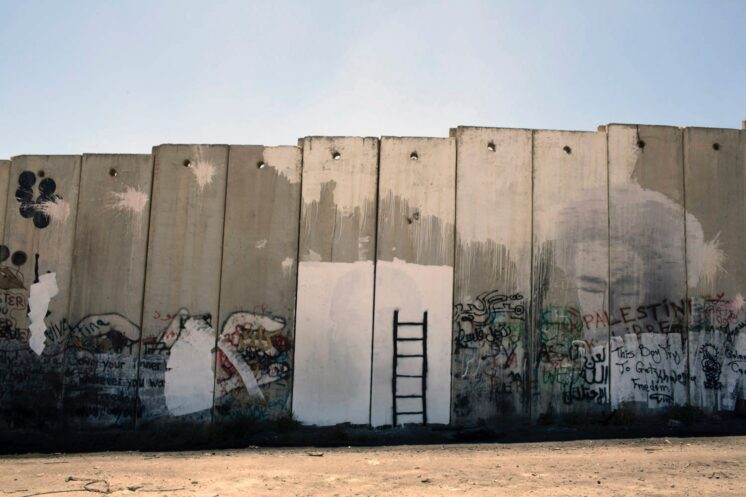The Mexican company CEMEX has sought to legitimise its supply of construction materials to the Israeli government, which are used to build illegal settlements and the annexation wall, by proclaiming that its actions comply with Israeli law. Civil society groups have responded by reframing the case in terms of international law, specifically the company’s complicity in the Israeli government’s violation of international human rights and humanitarian law.

Mind the Gap highlighted CEMEX’s claims in a case study on the harmful strategy of aligning with repressive State institutions. CEMEX’s Israeli subsidiary Readymix provides building materials for Israel’s annexation wall in and around the West Bank and for the building of Israeli settlements inside the West Bank (Occupied Palestinian Territory, OPT). In 2004, an advisory opinion of the International Court of Justice found that both the annexation wall and settlements violated Israel’s obligations under international law.[1] The United Nations Security Council and legal experts have repeatedly condemned the illegal settlements and their expansion by the Israeli government.[2]
CEMEX has repeatedly sought to emphasise the legality of its operations under Israeli law while not engaging with the serious international law issues. For example, in response to a Norwegian pension fund divesting from CEMEX due to concerns about the company’s operations in the West Bank, CEMEX stated that its “concrete plants are located in legal settlements approved by the Israeli government and validated by the Supreme Tribunal of Justice of Israel”.[3] Similarly, CEMEX stated that “The plants referred to in the report are within industrial zones in the Israeli administered Area C of the West Bank and hold all required permits and authorizations to conduct their activity.”[4] These statements demonstrate CEMEX’s alignment with the Israeli government’s position that the settlements are legal under national law, but ignore the illegality of Israel’s settlements and annexation wall under international law.
Civil society has called on CEMEX to end its complicity in Israel’s human rights violations in the OPT.[5] In 2021, more than 130 Mexican civil society organisations publicly demanded CEMEX withdraw from its operations in the OPT and Golan Heights.[6]
The campaign against CEMEX has achieved some successes. In 2013, Norwegian bank Nordea excluded CEMEX from its investment portfolio due to the company’s human right violations and its extraction of non-renewable resources from the OPT.[7] Similarly, in 2015, Norwegian insurance company KLP excluded CEMEX from its portfolio due to the company’s quarries in the West Bank.[8] KLP stated that these quarries were incompatible with the international law of belligerent occupation.[9]
As CEMEX still supplies materials used by the Israeli government for its illegal structures, the campaign against CEMEX is ongoing.
The Stop Cemex campaign is part of the broader BDS movement urging Boycotts, Divestment, and Sanctions against Israel. Divestment campaigns encourage investors (including banks, pension funds, and universities) to withdraw investments from Israel and from all companies directly or indirectly involved in the illegal Israeli occupation.[10] Similar to the Stop Cemex campaign, the BDS movement focuses on the Israeli government’s violations of Palestinian people’s rights under international law.
[1] International Court of Justice, “Legal Consequences of the Construction of a Wall in the Occupied Palestinian Territory,” Advisory opinion of July 9, 2004, https://www.icj-cij.org/public/files/case-related/131/131-20040709-ADV-01-00-EN.pdf (accessed 9 August 2022). See also International Court of Justice, “Legal Consequences of the Construction of a Wall in the Occupied Palestinian Territory,” https://www.icj-cij.org/en/case/131 (accessed 9 August 2022).
[2] See, for example, United Nations Security Council, “Resolution 2334 (2016),” S/RES/2334 (2016),
December 23, 2016, https://www.un.org/webcast/pdfs/SRES2334-2016.pdf (accessed 9 August 2022); United Nations, “Israel settlement expansion ‘tramples’ on human rights law, experts contend,” November 3, 2021, https://news.un.org/en/story/2021/11/1104792 (accessed 9 August 2022).
[3] Business & Human Rights Resource Centre, “CEMEX response (unofficial translation by Business & Human Rights Resource Centre),” September 9, 2015, https://www.business-humanrights.org/en/cemex-response-unofficial-translation-by-business-human-rights-resource-centre (accessed 9 August 2022).
[4] CEMEX, “Email: Review Comments,” May 13, 2020.
[5] BDS Movement, “200+ Latin American Orgs Urge Mexican Multinational Cemex To End Complicity In Israeli Crimes,” July 13, 2017, https://bdsmovement.net/news/200-latin-american-orgs-urge-mexican-multinational-cemex-end-complicity-israeli-crimes (accessed 9 August 2022).
[6] BDS Movement, “More than 130 Mexican civil rights organizations demand CEMEX end complicity with Israeli apartheid,” April 28, 2021, https://bdsmovement.net/news/more-130-mexican-civil-rights-organizations-demand-cemex%C2%A0end-complicity-with-israeli-apartheid (accessed 9 August 2022).
[7] Nordea, “Responsible Investments & Identity – Annual report 2013,” 2013, https://www.nordea.com/en/doc/riiannual2013web.pdf (accessed 9 August 2022); BDS Movement, “Cemex excluded from Nordea’s investment portfolio due to extraction of Palestinian natural resources,” August 26, 2013, https://bdsmovement.net/news/cemex-excluded-nordea%E2%80%99s-investment-portfolio-due-extraction-palestinian-natural-resources (accessed 9 August 2022).
[8] Business & Human Rights Resource Centre, “Palestine: Norwegian insurer KPL excludes Cemex and HeidlebergCement from its investments due to operations in the territories occupied by Israel; companies responded,” September 3, 2015, https://www.business-humanrights.org/es/%C3%BAltimas-noticias/palestina-aseguradora-noruega-kpl-excluye-de-sus-inversiones-a-cemex-y-heidlebergcement-por-operaciones-en-los-territorios-ocupados-por-israel-las-empresas-respondieron/ (accessed 9 August 2022).
[9] KLP, “Decision to exclude from investments,” June 1, 2015, https://www.klp.no/en/english-pdf/Heidelberg%20og%20CEMEX%20beslutning%20om%20utelukkelse%20ENG.pdf (accessed 9 August 2022). HeidelbergCement AG, another building materials company operating through its wholly owned subsidiary in the West Bank, was also excluded by KLP. For more information on HeidelbergCement’s harmful strategies in the OPT, see Mind the Gap’s case study for the strategy Aligning with suppressive State institutions.
[10] BDS movement, “What is BDS?,” https://bdsmovement.net/what-is-bds (accessed 9 August 2022).
